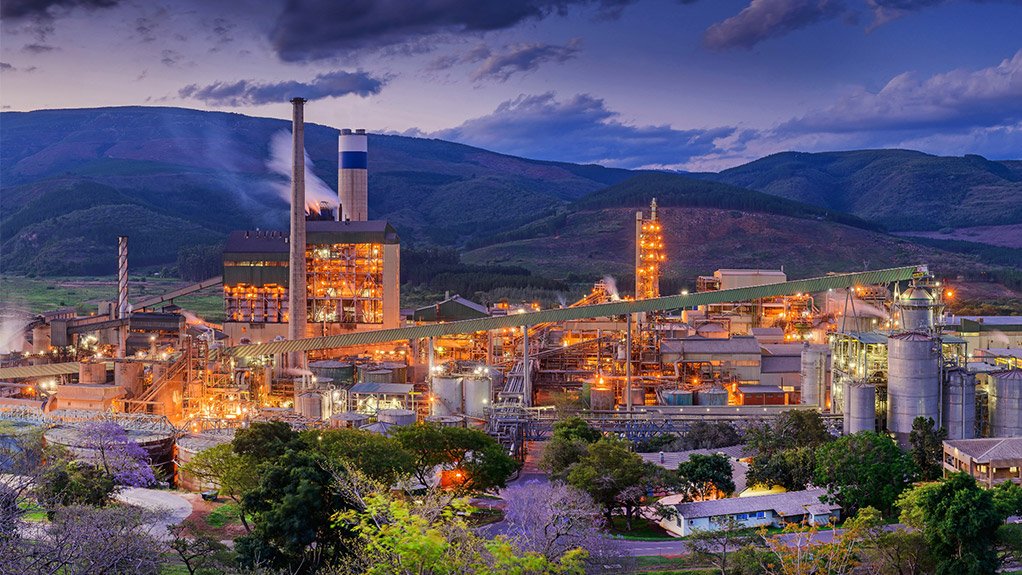Sappi delivers first-quarter Ebitda growth as higher selling prices offset cost inflation, lower sales
Pulp and paper manufacturer Sappi recorded a strong performance for the first quarter of its 2023 financial year – well above pre-Covid-19 levels and the best ever first-quarter results, CEO Steve Binnie points out.
Its earnings before interest, taxes, depreciation and amortisation (Ebitda) for the quarter ended December 31, 2022, of $290-million, were 21% higher year-on-year and in line with guidance.
The positive results were underpinned by year-on-year pricing gains for paper products, which offset cost inflation and lower sales volumes to deliver an Ebitda margin of 17.5%, Binnie says.
“The lower profits relative to the record levels in the prior quarter were reflective of the slowing global economy, which led to a softening in demand for our products, driven by the volatile and uncertain macroeconomic context including ongoing geopolitical turmoil, rampant inflation, rising interest rates and an underperforming Chinese economy, as well as rapid downstream inventory accumulation in all our major product categories,” Sappi outlines.
“Factoring in the protracted macroeconomic uncertainty, and coming off three quarters of outperformance, we anticipate a return to a normalised level of earnings in full-year 2023.
“The second quarter will likely be the most challenging with a recovery in earnings expected later in the financial year. Ebitda for the second quarter of full-year 2023 is expected to be below that of the first quarter,” Binnie warns.
Sappi posted a net profit of $190-million for the quarter under review, compared with a profit of $123-million in the first quarter of the prior financial year, while net debt decreased to $1.24-billion, from $1.92-billion in the prior comparable quarter.
Sappi notes that recent improvements in global supply chains resulted in a reduction in delivery lead times and a surge in customer inventory levels.
The same market dynamics of elevated retailer stock levels and general concerns over negative consumer sentiment adversely impacted on demand for all textile fibres, placing pressure on the hardwood dissolving pulp market price which decreased to $900/t by quarter’s end.
Despite this pressure, Sappi’s net average sales price for the pulp segment was 9% higher than a year ago, although this was offset by an 8% reduction in sales volumes.
Underlying demand in the packaging and speciality papers segment remained relatively stable. Selling price realisation more than offset the lower sales volumes and supported year-on-year margin expansion for the segment. Sales volumes were down 14% compared with the prior comparable quarter, driven primarily by the large customer inventory build.
A series of price increases in the previous year neutralised the impact of cost inflation and lower sales volumes in the graphic papers segment. Margins remained healthy but reduced relative to the highs of recent quarters. Sales volumes were down 31% compared with the prior comparable quarter as a result of production rates having been optimised to match sales.
The profitability of Sappi’s operations in the European region improved substantially compared with the prior year as pricing gains offset cost inflation. Lower demand occurred across all product categories and there was a significant inventory build. Selling prices remained stable quarter-on-quarter, which protected margins, Sappi notes.
The North American region delivered another strong performance, with first-quarter Ebitda of $114-million. Selling price gains offset significant cost inflation but sales volumes were negatively impacted on by a broad-based softening in paper demand towards the latter part of the quarter.
SOUTH AFRICAN OPERATIONS
Significant year-on-year cost inflation and slightly reduced sales volumes negatively impacted on the profitability of the South Africa region, despite the higher average dollar selling price for Verve – Sappi’s dissolving pulp brand – and a significant rand:dollar exchange rate benefit on the rand selling price.
A fire in a municipal electrical substation disrupted production at the three operations in the KwaZulu-Natal region during the quarter.
Sappi points out that supply chain disruptions had eased and that the group was able to establish alternative modes of shipping to alleviate the bottlenecks at the Durban port.
“Good progress was made shipping from the Maputo port, in Mozambique, with 20% of Ngodwana Mill’s Verve sales volumes shipped using this alternate route,” the group points out.
Further, tight containerboard markets created robust demand for Sappi’s packaging grades as customers sought to replenish low stock levels. Sales volumes were, however, constrained by lower-than-planned production owing to a slower-than-expected ramp-up after the extended shut in the prior quarter for the containerboard machine upgrade at the Ngodwana Mill.
Improved office paper and newsprint sales volumes and pricing helped to offset variable cost pressures and substantially improved profitability in the graphic papers segment compared with the previous year, Sappi notes.
OUTLOOK
Although the global economy is expected to continue facing significant challenges this year, the recent easing of the energy crisis in Europe, the slowing of global inflation and the opening of the Chinese economy are seen as positive economic indicators.
Nevertheless, Sappi says the short-term outlook is expected to be negatively impacted on by the combination of the final phase of the downstream inventory destocking cycle, the resulting impact on sales volumes across all market segments and the relatively high cost base, albeit this is starting to turn.
“The opening of the Chinese economy following the relaxation of Covid restrictions and strengthening of the renminbi against the dollar represent upside potential toward the second half of the calendar year for the dissolving pulp segment. Viscose staple fibre producer operating rates and pricing are slowly increasing and order activity in China has resumed in recent weeks.
“Downstream inventory levels for our paper products have declined in recent months but remain at historically elevated levels. It may take a further few months before order activity normalises,” Sappi states.
Cost inflation is expected to recede in full-year 2023. Specifically, lower European natural gas prices are expected to have a positive impact on European costs.
Globally, paper pulp prices are expected to decline as new Latin American capacity enters the market.
Sappi notes that pulp prices in the US and Europe are lagging relative to Asia and, therefore, it may take time for benefits to be realised.
Logistics bottlenecks are steadily improving and delivery costs are anticipated to reduce through full-year 2023. Similarly, chemical costs have started to decline in recent weeks.
Capital expenditure is estimated to be $430-million for full-year 2023 and includes $70-million for the Somerset PM2 conversion and expansion project.
The divestment of three European mills to Aurelius is expected to close during the second quarter. The cash proceeds and receivables will be collected in the second and third quarters.
Article Enquiry
Email Article
Save Article
Feedback
To advertise email advertising@creamermedia.co.za or click here
Press Office
Announcements
What's On
Subscribe to improve your user experience...
Option 1 (equivalent of R125 a month):
Receive a weekly copy of Creamer Media's Engineering News & Mining Weekly magazine
(print copy for those in South Africa and e-magazine for those outside of South Africa)
Receive daily email newsletters
Access to full search results
Access archive of magazine back copies
Access to Projects in Progress
Access to ONE Research Report of your choice in PDF format
Option 2 (equivalent of R375 a month):
All benefits from Option 1
PLUS
Access to Creamer Media's Research Channel Africa for ALL Research Reports, in PDF format, on various industrial and mining sectors
including Electricity; Water; Energy Transition; Hydrogen; Roads, Rail and Ports; Coal; Gold; Platinum; Battery Metals; etc.
Already a subscriber?
Forgotten your password?
Receive weekly copy of Creamer Media's Engineering News & Mining Weekly magazine (print copy for those in South Africa and e-magazine for those outside of South Africa)
➕
Recieve daily email newsletters
➕
Access to full search results
➕
Access archive of magazine back copies
➕
Access to Projects in Progress
➕
Access to ONE Research Report of your choice in PDF format
RESEARCH CHANNEL AFRICA
R4500 (equivalent of R375 a month)
SUBSCRIBEAll benefits from Option 1
➕
Access to Creamer Media's Research Channel Africa for ALL Research Reports on various industrial and mining sectors, in PDF format, including on:
Electricity
➕
Water
➕
Energy Transition
➕
Hydrogen
➕
Roads, Rail and Ports
➕
Coal
➕
Gold
➕
Platinum
➕
Battery Metals
➕
etc.
Receive all benefits from Option 1 or Option 2 delivered to numerous people at your company
➕
Multiple User names and Passwords for simultaneous log-ins
➕
Intranet integration access to all in your organisation




















